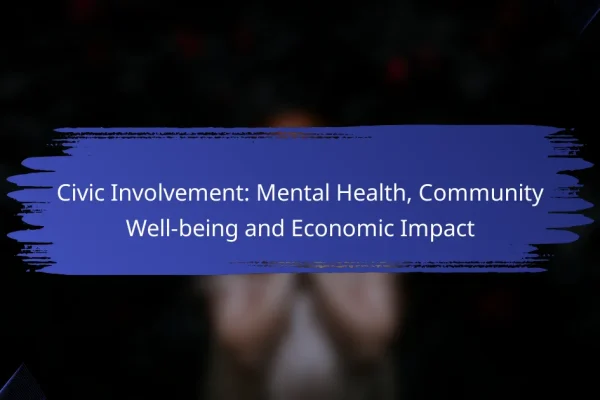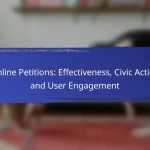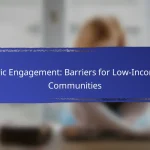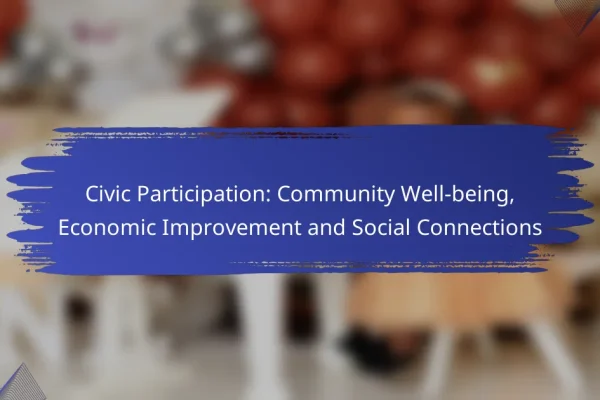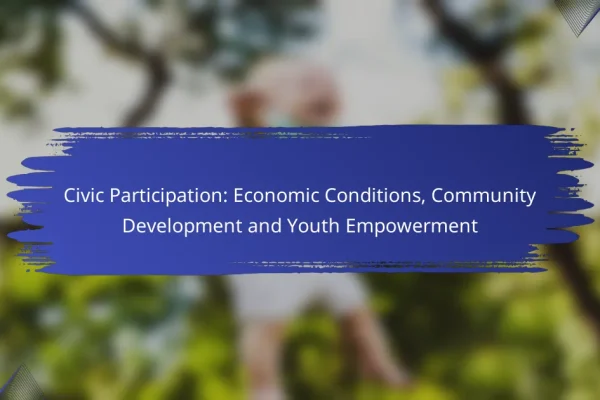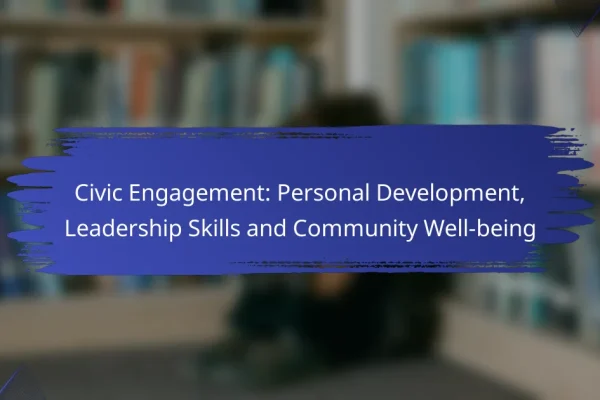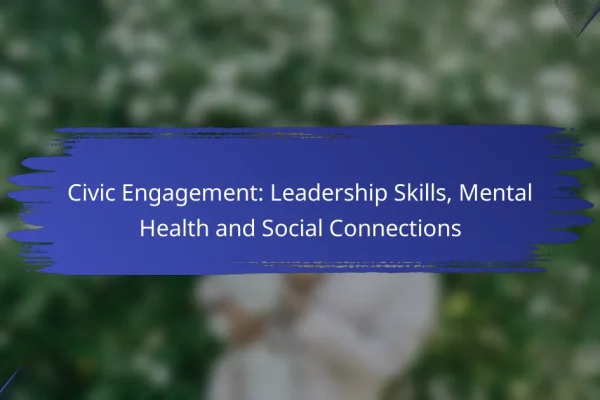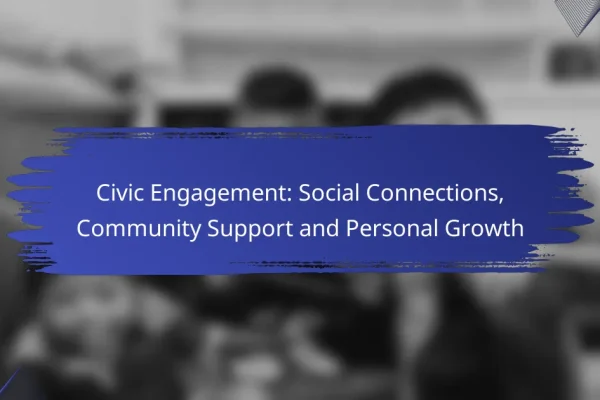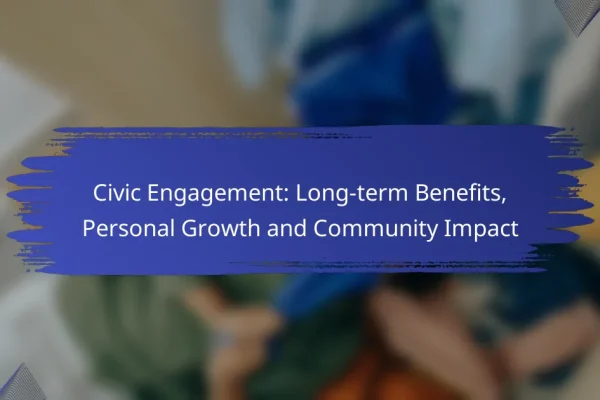What are the benefits of civic engagement in communities?
Civic engagement offers numerous benefits to communities, including fostering a sense of belonging and improving the quality of life. By actively participating in local governance and community activities, individuals can influence decisions that affect their lives and strengthen social ties.
Improved community cohesion
Community cohesion is enhanced when individuals engage in civic activities, leading to stronger relationships among residents. Participation in local events, such as town hall meetings or volunteer projects, encourages collaboration and mutual support.
For example, neighborhoods that organize regular clean-up days or social gatherings often see increased trust and cooperation among residents. This sense of belonging can reduce crime rates and improve overall community well-being.
Increased political awareness
Civic engagement significantly boosts political awareness among community members. When individuals participate in discussions and decision-making processes, they become more informed about local issues, policies, and governance.
Attending school board meetings or city council sessions can help residents understand how decisions are made and how they can voice their opinions effectively. This awareness often leads to higher voter turnout and more informed electoral choices.
Enhanced public services
Active civic engagement can lead to improved public services as community members advocate for their needs. When residents collaborate with local governments, they can identify gaps in services and propose solutions.
For instance, a community that regularly communicates with local authorities about road maintenance or public transportation can ensure that their concerns are addressed promptly, resulting in better infrastructure and services.
Greater civic responsibility
Civic engagement fosters a sense of civic responsibility among individuals, encouraging them to take ownership of their community. When people are involved in local governance, they are more likely to contribute positively and hold themselves accountable for their actions.
Participating in local initiatives, such as neighborhood watch programs or community gardens, instills a sense of duty to contribute to the common good, which can inspire others to do the same.
Stronger local economies
Civic engagement can bolster local economies by encouraging residents to support local businesses and initiatives. When community members are actively involved, they are more likely to invest in their local economy through shopping at nearby stores or participating in local events.
For example, communities that host farmers’ markets or local fairs not only promote local products but also create opportunities for small businesses to thrive, ultimately benefiting the entire community.
How does civic engagement impact local governance?
Civic engagement significantly enhances local governance by fostering a more participatory environment where citizens can influence decision-making. This involvement leads to improved public trust and more responsive policies that reflect community needs.
Encourages transparency
Civic engagement promotes transparency by ensuring that local government actions are visible and understandable to the public. When citizens are actively involved, they demand clearer communication about policies and decisions, which helps to reduce corruption and build trust.
For example, public forums and community meetings allow residents to ask questions and receive direct answers from officials, creating an open dialogue that demystifies government processes.
Promotes accountability
Engaged citizens hold local officials accountable for their actions and decisions, ensuring that elected representatives act in the best interest of their constituents. This accountability can lead to better governance as officials understand they are being watched and evaluated by the community.
Regular feedback mechanisms, such as surveys or town hall meetings, can help gauge public satisfaction and encourage officials to address concerns promptly, fostering a culture of responsibility.
Facilitates community input
Civic engagement allows for diverse community input, which is essential for effective local governance. When citizens share their perspectives, it leads to more comprehensive and inclusive policy-making that considers various viewpoints and needs.
Local governments can implement advisory boards or committees that include community members, ensuring that decisions reflect the interests of different demographic groups. This practice not only enriches the decision-making process but also empowers citizens to take an active role in shaping their community’s future.
What are effective civic engagement strategies?
Effective civic engagement strategies include methods that actively involve community members in decision-making processes. These strategies foster participation, enhance communication, and build trust between citizens and local authorities.
Community forums
Community forums serve as platforms for residents to discuss local issues and share their opinions. These gatherings can be held in person or online, allowing for broader participation. Organizing regular forums encourages ongoing dialogue and helps identify community needs.
To maximize effectiveness, ensure forums are accessible and promote them through local channels. Consider using facilitators to guide discussions and keep conversations productive.
Volunteer programs
Volunteer programs engage citizens in hands-on activities that benefit the community. These programs can range from environmental clean-ups to mentoring youth, providing opportunities for individuals to contribute their time and skills.
When designing volunteer initiatives, focus on clear goals and provide adequate training for participants. Recognizing volunteers through events or awards can also boost morale and encourage ongoing involvement.
Social media campaigns
Social media campaigns leverage platforms like Facebook, Twitter, and Instagram to raise awareness and mobilize community action. These campaigns can effectively reach diverse audiences and facilitate discussions on pressing local issues.
To create impactful campaigns, use engaging visuals and concise messaging. Monitor engagement metrics to assess effectiveness and adjust strategies as needed to enhance outreach.
Partnerships with local organizations
Partnerships with local organizations can amplify civic engagement efforts by combining resources and expertise. Collaborating with schools, nonprofits, and businesses can lead to innovative solutions and broader community involvement.
When forming partnerships, establish clear objectives and roles for each party. Regular communication and shared accountability will strengthen these collaborations and ensure successful outcomes.
What role do educational institutions play in civic engagement?
Educational institutions play a crucial role in fostering civic engagement by providing students with the knowledge and skills necessary to participate actively in their communities. They create an environment that encourages awareness of social issues and promotes active citizenship through various programs and initiatives.
Promoting civic education
Promoting civic education is essential for developing informed citizens. Schools and universities often incorporate courses that cover government, history, and social studies, helping students understand their rights and responsibilities. This foundational knowledge empowers students to engage meaningfully in civic activities.
In addition to traditional curricula, many institutions offer workshops and seminars that address current events and civic issues, encouraging students to think critically about their roles in society. These programs often include discussions on local governance and community challenges.
Encouraging student participation
Encouraging student participation in civic activities can significantly enhance their engagement levels. Educational institutions often facilitate opportunities for students to join clubs, organizations, or student government, where they can voice their opinions and influence decisions. This involvement helps students develop leadership skills and a sense of responsibility.
Moreover, institutions may offer incentives for participation, such as community service hours or recognition awards, motivating students to take part in civic initiatives. Schools can also partner with local organizations to provide students with real-world experiences that deepen their understanding of civic involvement.
Hosting community service events
Hosting community service events is a practical way for educational institutions to promote civic engagement. These events allow students to contribute directly to their communities while developing teamwork and problem-solving skills. Common activities include food drives, clean-up days, and volunteering at local shelters.
Institutions can collaborate with local nonprofits to create meaningful service opportunities that align with students’ interests. By participating in these events, students not only help address community needs but also gain valuable insights into the impact of civic engagement on societal well-being.
How can technology enhance civic engagement?
Technology can significantly enhance civic engagement by providing accessible platforms for communication and collaboration among citizens. It facilitates real-time discussions, information sharing, and mobilization for community initiatives, making it easier for individuals to participate in civic activities.
Online platforms for discussion
Online platforms serve as vital spaces for civic engagement, allowing individuals to discuss issues, share opinions, and organize events. Social media sites, forums, and dedicated civic engagement platforms enable users to connect with like-minded individuals and engage in constructive dialogue.
Examples of popular online platforms include Facebook, Twitter, and Reddit, which host various groups focused on local and national issues. Additionally, platforms like Nextdoor foster neighborhood discussions, helping residents stay informed about community matters.
When using online platforms for civic engagement, it’s essential to ensure respectful communication and verify information before sharing. Avoiding misinformation and fostering a culture of constructive debate can enhance the overall quality of discussions and encourage broader participation.
